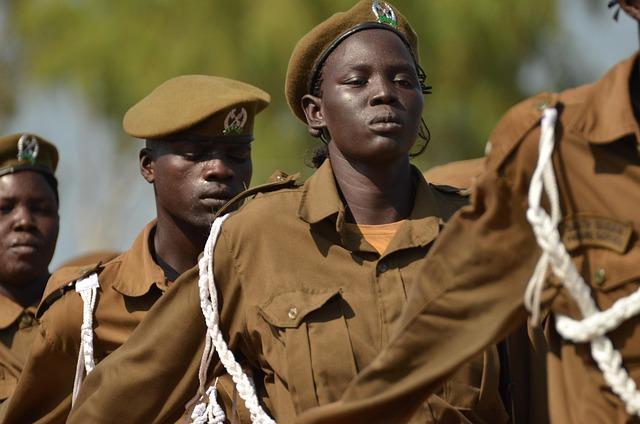Title: Sudan Condemns Kenya for hosting RSF-Aligned Political Event
In a meaningful diplomatic fallout, Sudan has publicly criticized Kenya for its decision to host a political event linked to the Rapid Support Forces (RSF), a paramilitary group embroiled in the country’s ongoing conflict. The Sudanese government’s strong condemnation underscores the rising tensions in the region,as it accuses Nairobi of undermining sudan’s sovereignty and stability.The RSF, initially formed to combat insurgencies in darfur, has increasingly become a controversial player in Sudan’s fractious political landscape. This incident not only highlights the intricate web of regional politics but also raises questions about the role of neighboring countries in internal conflicts. As Sudan grapples with its challenges, the implications of Kenya’s actions coudl have far-reaching consequences for bilateral relations and regional dynamics in East Africa.
Sudan’s Diplomatic Outrage Over Nairobi’s Political Event Hosting

The recent political gathering in Nairobi, which featured factions aligned with the Rapid Support Forces (RSF) of Sudan, has sparked a diplomatic uproar from Khartoum. Sudan’s government condemned Kenya for what it views as a tacit endorsement of a group it accuses of exacerbating conflict and instability in the region. Officials have emphasized that the event undermines regional cooperation and peace efforts, asserting that it contradicts Kenya’s role as a mediator in Sudanese affairs. Sudan’s Foreign Ministry has issued statements highlighting the potential consequences for diplomatic relations between the two nations.
In response to nairobi’s decision, Sudan’s concerns prompt a reevaluation of kenya’s position within east Africa’s complex political landscape. the Sudanese government has called for a rigorous examination of the implications of this political event,arguing that it sends a troubling signal to the international community regarding Kenya’s commitment to fostering stability. Key points of contention include:
- Support for armed groups: Sudan accuses Kenya of providing legitimacy to forces it deems insurgent.
- Regional security: The event is seen as a destabilizing influence that could exacerbate ongoing conflicts.
- Diplomatic relationships: Sudan warns of potential repercussions for future diplomatic engagements with Kenya.
The Implications of Kenya’s Engagement with RSF-Aligned Figures

Kenya’s recent decision to host a political event aligned with the Rapid Support Forces (RSF) has drawn sharp criticism from Sudan, highlighting the potential geopolitical ramifications of such an engagement. The RSF, a paramilitary group linked to various human rights abuses, has become a polarizing entity in the region, and Kenya’s association with them may lead to strained diplomatic relations between the two nations. Analysts argue that this move could embolden the RSF’s influence, effectively shifting the balance of power within Sudan and complicating the already turbulent political landscape in the region.
Moreover,this engagement raises questions about Kenya’s intentions and long-term strategy in East Africa. By hosting figures associated with the RSF, Kenya risks alienating itself from traditional allies who prioritize stability and human rights. It may also spur a domino effect where other nations reconsider their ties or support for Kenya. The implications are manifold:
- Diplomatic Tensions: Potential fallout in relationships with governments that oppose RSF actions.
- Regional Security: Increased instability if RSF gains legitimacy through international support.
- Public Perception: Domestic and international backlash affecting Kenya’s global standing.
Analyzing the Historical Context of Sudan-Kenya Relations

The relationship between Sudan and Kenya has been shaped by a complex interplay of political, economic, and social factors over the years. Historically, Sudan has viewed Kenya through a lens of cautious engagement, ofen influenced by regional dynamics and the ideological underpinnings of each government. The post-colonial legacy in both nations can be traced, as each grappled with internal strife and external pressures affecting their sovereignty. Significant events, such as the Darfur conflict and Kenya’s role in the International Criminal Court proceedings against Sudanese leaders, have contributed to a fragmented diplomatic rapport characterized by both tension and sporadic cooperation.
Moreover,the recent political events highlight the divergent paths both countries have taken,especially in response to the crisis involving the rapid Support Forces (RSF) in Sudan. Kenya’s decision to host a political event that aligns with RSF interests signifies a potential realignment in regional alliances and a departure from traditional diplomatic norms. This has led to Sudan’s sharp condemnation, emphasizing the importance of recognizing historical grievances, respecting sovereignty, and understanding the broader implications that such gatherings have for peace and stability in the region. The current climate necessitates a careful evaluation of longstanding ties and the emerging geopolitical landscape of East Africa.
Recommendations for Kenya to Navigate Tensions with sudan

To effectively manage the current tensions with Sudan, Kenya must adopt a proactive diplomatic approach that emphasizes open communication and multilateral engagement. Prioritizing dialog with Sudanese officials can help clarify intentions behind hosting events perceived as supportive of the rapid Support Forces (RSF). Diplomats should also seek to leverage their connections within the African Union to facilitate discussions aimed at addressing concerns while fostering regional stability.
Moreover, implementing confidence-building measures can enhance mutual trust and ease tensions. This may include actions such as:
- Hosting joint forums to discuss shared security issues
- Engaging in cooperative economic initiatives
- Providing platforms for civil society collaboration between both nations
Additionally, a transparent public communication strategy is essential. Kenya should strive to clearly articulate its position on the political events and demonstrate its commitment to impartiality and regional peace. This can mitigate misunderstandings and promote a more positive perception within Sudan.
The Role of International Community in Mitigating Regional Disputes

The international community plays a crucial role in addressing regional disputes by facilitating dialogue and fostering an environment conducive to peace. In the case of Sudan’s recent criticism of Kenya for hosting an event aligned with the Rapid support Forces (RSF), it is indeed essential for global powers and organizations to mediate and encourage transparent discussions among the involved parties. By providing platforms for negotiation, they can help de-escalate tensions and create pathways toward reconciliation. Key actions the international community can undertake include:
- Encouraging Diplomatic Engagement: Promoting discussions between opposing factions to build mutual understanding.
- Providing Neutral Mediation: Offering neutral ground for negotiations can help in mitigating biases and fostering fairness.
- Implementing Sanctions or Incentives: Utilizing sanctions against aggressors or providing incentives for peace can shift actor behaviors considerably.
Moreover, long-term stability can be achieved through collaborative efforts in humanitarian assistance and support for democratic processes. Assistance in rebuilding institutions and bolstering civil society can create resilient frameworks that withstand conflict and promote dialogue. The commitment of international actors can be further illustrated through:
| Action | Impact |
|---|---|
| Monitoring Ceasefires | Reduction in violence and a step towards peace. |
| Supporting Humanitarian Aid | Alleviates human suffering and promotes goodwill. |
| Facilitating elections | Strengthens democratic governance and political legitimacy. |
Future Prospects for Peace and Stability in the Horn of Africa

The recent condemnation by Sudan of Kenya’s hosting of a political event aligned with the Rapid Support Forces (RSF) underscores the growing tensions that threaten regional peace and stability. This incident paints a broader picture of a fragmented horn of Africa, where alliances and rivalries influence the political climate. Key elements contributing to this volatile situation include:
- Proxy Conflicts: Increasing involvement of foreign and domestic actors complicates the landscape, often exacerbating existing disputes.
- Resource Competition: Scarcity of vital resources like water and arable land fuels disputes between nations, particularly in areas like Sudan and South Sudan.
- Terrorist Threats: The presence of extremist groups which destabilize regions further complicates efforts toward peace.
While the current scenario appears grim, there remain pathways to restore balance and foster cooperation among Horn of Africa nations. Potential approaches include:
- Diplomatic Engagement: Establishing formal dialogues among countries can help address grievances and build trust.
- Regional Partnerships: collaborative initiatives focusing on shared challenges, such as climate change and economic advancement, could unite nations towards common goals.
- International Support: Leveraging resources from global entities like the African Union can aid in mediation efforts and post-conflict recovery.
| Challenge | Potential Solution |
|---|---|
| Political Fragmentation | Strengthen regional governance institutions |
| Ethnic Tensions | Promote inclusive national dialogues |
| Economic Instability | Enhance cross-border trade agreements |
Wrapping Up
Sudan’s condemnation of Kenya for hosting a political event aligned with the Rapid Support Forces (RSF) underscores the complexities and sensitivities surrounding regional geopolitics in East Africa. As the situation in Sudan continues to evolve, the implications of international alliances and actions will be crucial in shaping the future dynamics of the region.The Sudanese government’s strong reaction signals a broader concern about the influence of the RSF and its role in the continuing turmoil in Sudan.With diplomatic relations in flux, it remains essential for regional actors to navigate these tensions carefully, fostering dialogue that prioritizes stability and peace.As developments unfold, observers will be closely watching how this incident may affect bilateral relations and the overarching quest for resolution in the Sudanese conflict.







